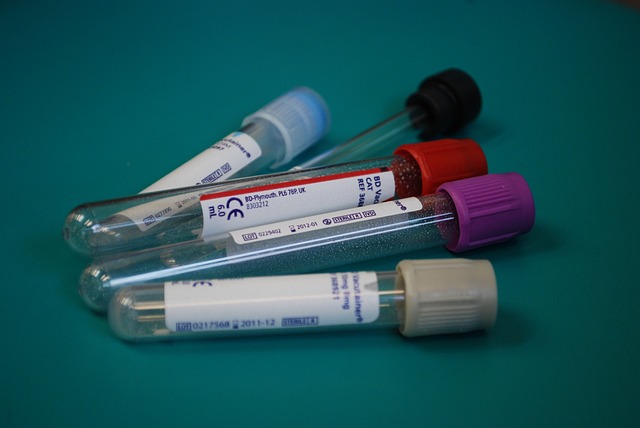Liver Function Tests (LFTs), including the UK Standard Thyroid Blood Test, are essential for evaluating liver health, ranging from mild inflammation to severe conditions like cirrhosis or hepatitis. Key enzymes (ALT, AST, ALP, GGT) and bilirubin levels provide insights into liver function when interpreted alongside patient history and symptoms. Normal thyroid hormone ranges (T4, T3, TSH) are crucial for assessing thyroid health; deviations may indicate hypothyroidism, hyperthyroidism, or thyroiditis. Elevated ALT and AST signal potential hepatic issues, aiding in the detection of conditions like hepatitis or fatty liver disease through comparison with lab reference ranges. Comprehensive consideration of patient history, symptoms, and other test results is essential for accurate diagnosis and timely patient care.
“Uncover the intricacies of liver health with our comprehensive guide, tailored for medical professionals. This article delves into the crucial aspect of liver function tests (LFTs), offering a detailed exploration for expert analysis. We dissect the UK Standard Thyroid Blood Test, highlighting key parameters and normal ranges, enabling accurate interpretation. Learn to identify abnormalities in liver enzymes, understanding the significance for patient care. Stay informed, enhance diagnostics, and navigate liver health assessments with confidence.”
- Understanding Liver Function Tests: A Comprehensive Guide for Professionals
- UK Standard Thyroid Blood Test: Key Parameters and Normal Ranges
- Interpreting Results: When and How to Identify Abnormalities in Liver Enzymes
Understanding Liver Function Tests: A Comprehensive Guide for Professionals
Liver function tests (LFTs) are a crucial diagnostic tool for medical professionals, offering insights into the health and functionality of the liver. These tests are essential for detecting and monitoring various liver conditions, from mild inflammation to more severe ailments like cirrhosis or hepatitis. In the UK, healthcare providers often rely on standard thyroid blood tests as part of their comprehensive LFTs, ensuring a holistic evaluation of hepatic health.
Understanding LFT results requires knowledge of key enzymes and markers. Enzymes such as alanine aminotransferase (ALT), aspartate aminotransferase (AST), alkaline phosphatase (ALP), and gamma-glutamyl transferase (GGT) play pivotal roles. Elevated levels of these enzymes can indicate liver damage or inflammation, prompting further investigation. Additionally, bilirubin, a breakdown product of red blood cells, is monitored; elevated bilirubin levels may suggest biliary tract issues or haemolytic anaemia. By interpreting these results alongside patient history and clinical symptoms, medical professionals can effectively navigate the complex landscape of liver health assessment.
UK Standard Thyroid Blood Test: Key Parameters and Normal Ranges
The UK Standard Thyroid Blood Test is a crucial diagnostic tool for medical professionals to assess thyroid function and identify potential abnormalities. This test measures key parameters related to thyroid hormones in the blood, providing valuable insights into overall thyroid health. The primary markers of interest include thyroxine (T4), triiodothyronine (T3), and thyroid-stimulating hormone (TSH).
Normal ranges for these hormones are established based on population studies. For T4, typical values range from 9 to 12 key units (ku/l) in adults. T3 levels usually fall between 0.7 to 2.0 ku/l. TSH, the hormone that stimulates thyroid function, is generally maintained within a narrow window of 0.4 to 4.0 international units (IU/L). Any deviations from these normal ranges may indicate underlying thyroid disorders, such as hypothyroidism, hyperthyroidism, or thyroiditis, prompting further investigation and treatment.
Interpreting Results: When and How to Identify Abnormalities in Liver Enzymes
Interpreting results is a critical step in assessing liver health, and medical professionals must be adept at identifying abnormalities within liver enzymes. In the UK Standard Thyroid Blood Test, elevated levels of enzymes like ALT (alanine aminotransferase) and AST (aspartate aminotransferase) often signal hepatic issues. These enzymes are indicators of liver damage or inflammation, with AST being more sensitive to muscle damage, while ALT specifically targets liver cells.
Abnormalities can be detected through comparison with reference ranges established by reputable labs. Values significantly higher or lower than the normal range may indicate various conditions, from hepatitis and cirrhosis to fatty liver disease. Medical professionals should consider patient history, symptoms, and other lab results to confirm and diagnose any potential liver abnormalities, ensuring prompt and effective patient care.
Liver function tests are essential tools for medical professionals, enabling accurate diagnosis and effective management of liver-related conditions. By understanding the UK standard thyroid blood test parameters and normal ranges, healthcare providers can effectively interpret results, quickly identify abnormalities in liver enzymes, and take appropriate actions. This comprehensive guide equips professionals with the knowledge to navigate liver health assessments, ultimately improving patient outcomes.
